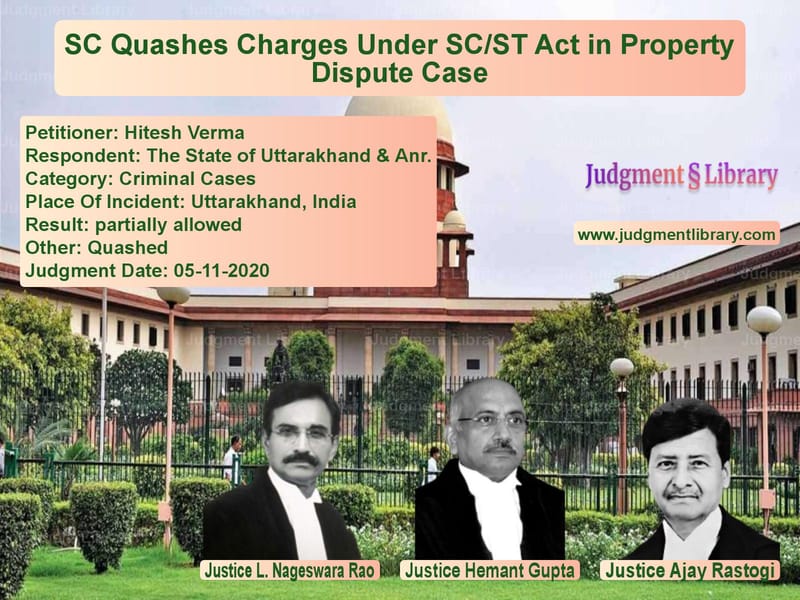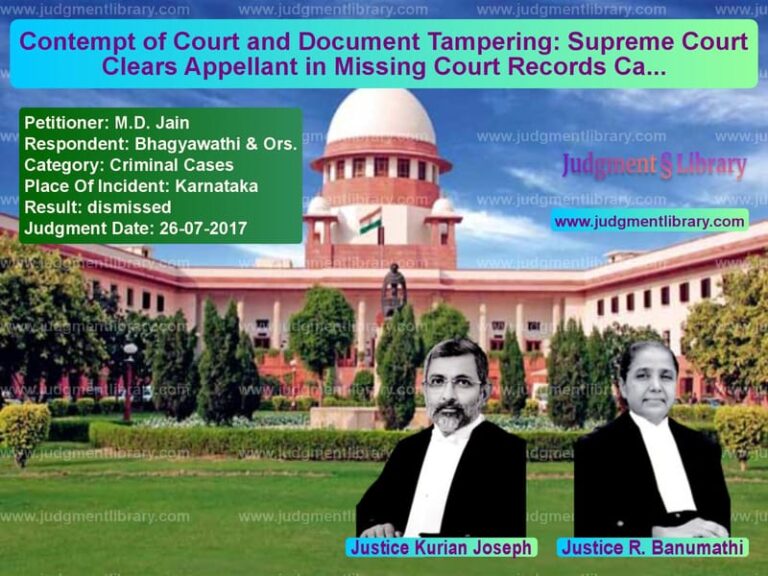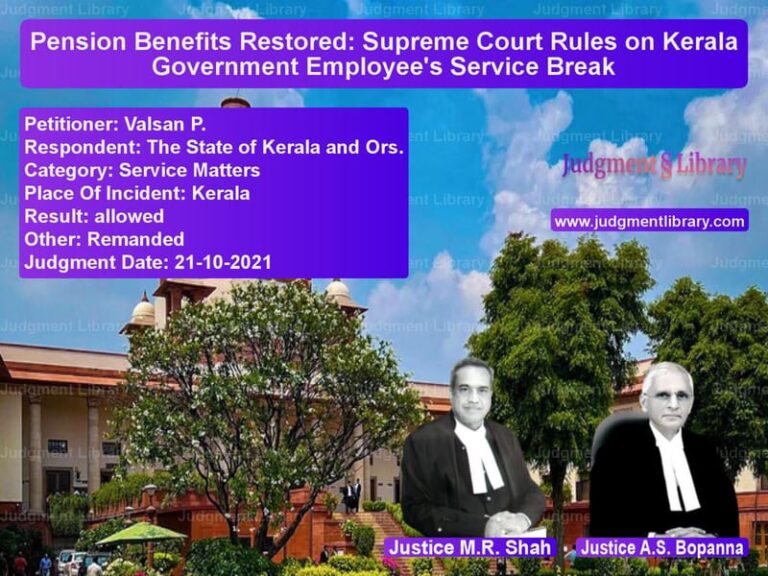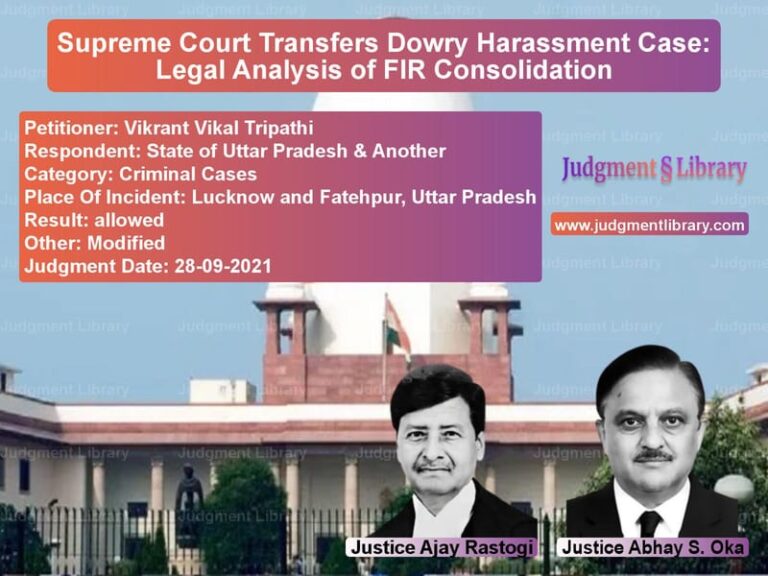SC Quashes Charges Under SC/ST Act in Property Dispute Case
The Supreme Court of India has ruled on a significant case concerning the misuse of the Scheduled Castes and Scheduled Tribes (Prevention of Atrocities) Act, 1989 (hereinafter referred to as ‘the Act’). The appeal, filed by Hitesh Verma, challenged an order passed by the High Court of Uttarakhand that had refused to quash the charge-sheet against him under the Act.
Background of the Case
The case originated from a property dispute between Hitesh Verma and the complainant, who belongs to a Scheduled Caste. The complainant alleged that Verma and his family members had been obstructing her from constructing a house on her legally owned land. She further claimed that the accused used caste-based abuses and threats against her on December 10, 2019, and subsequently stole construction material.
An FIR was registered against the appellant and others under Sections 452, 504, and 506 of the Indian Penal Code (IPC), along with Sections 3(1)(r) and 3(1)(e) of the Act. Following an investigation, the police submitted a charge-sheet, and the trial court took cognizance of the offenses. Verma then approached the High Court under Section 482 of the Criminal Procedure Code (CrPC) to quash the charge-sheet and the summoning order, which was dismissed.
Arguments by the Petitioner
Hitesh Verma, through his counsel, raised the following contentions:
- The allegations in the FIR were false and had been made with the intent to harass him in an ongoing property dispute.
- The alleged incident did not occur in a public place or within ‘public view,’ which is a necessary condition for an offense under Section 3(1)(r) of the Act.
- The complainant did not mention his caste in the FIR, which was required to establish an offense under the Act.
- The alleged property dispute was unrelated to caste discrimination and was a civil matter.
Arguments by the Respondent
The State of Uttarakhand and the complainant countered the appeal, arguing:
- Witnesses supported the complainant’s allegations of caste-based abuse.
- The accused had been preventing the complainant from exercising her property rights due to her caste status.
- The High Court correctly ruled that the police investigation had substantiated the allegations under the Act.
Supreme Court’s Observations
The Supreme Court carefully analyzed the elements of the offense under Section 3(1)(r) of the Act, which penalizes intentional insults or intimidation meant to humiliate a person belonging to a Scheduled Caste or Scheduled Tribe in a place ‘within public view.’
The Court observed:
“The offense must have been committed against the person on the ground that such person is a member of Scheduled Caste and Scheduled Tribe.”
The Court further noted that the dispute between the parties was primarily over the possession of land and that such a civil dispute does not automatically amount to an offense under the Act unless it is proven that the abuse was solely based on caste discrimination.
On ‘Public View’ Requirement
The Court relied on its previous ruling in Swaran Singh v. State, which distinguished between ‘public place’ and ‘place within public view.’ It clarified:
“If the offense is committed inside a building and no outsider is present, it is not within public view.”
Since the complainant alleged that the caste-based abuse occurred within the four walls of her house, the Court concluded that the requirement of ‘public view’ was not satisfied.
Final Judgment
After considering the facts and arguments, the Supreme Court ruled:
- The allegations did not make out an offense under Section 3(1)(r) of the Act.
- The charge-sheet under the Act was quashed.
- However, the trial for other offenses under IPC (Sections 452, 504, and 506) would continue.
Conclusion
This ruling reinforces the principle that criminal law cannot be used as a tool for settling civil disputes. The Supreme Court has reaffirmed that offenses under the SC/ST Act require clear proof of caste-based discrimination and must occur in a ‘public view’ setting. This decision is a crucial safeguard against the misuse of the Act while upholding its original intent of protecting marginalized communities from caste-based atrocities.
Petitioner Name: Hitesh Verma.Respondent Name: The State of Uttarakhand & Anr..Judgment By: Justice L. Nageswara Rao, Justice Hemant Gupta, Justice Ajay Rastogi.Place Of Incident: Uttarakhand, India.Judgment Date: 05-11-2020.
Don’t miss out on the full details! Download the complete judgment in PDF format below and gain valuable insights instantly!
Download Judgment: Hitesh Verma vs The State of Uttarak Supreme Court of India Judgment Dated 05-11-2020.pdf
Direct Downlaod Judgment: Direct downlaod this Judgment
See all petitions in SC/ST Act Case
See all petitions in Bail and Anticipatory Bail
See all petitions in Fundamental Rights
See all petitions in Judgment by L. Nageswara Rao
See all petitions in Judgment by Hemant Gupta
See all petitions in Judgment by Ajay Rastogi
See all petitions in partially allowed
See all petitions in Quashed
See all petitions in supreme court of India judgments November 2020
See all petitions in 2020 judgments
See all posts in Criminal Cases Category
See all allowed petitions in Criminal Cases Category
See all Dismissed petitions in Criminal Cases Category
See all partially allowed petitions in Criminal Cases Category







